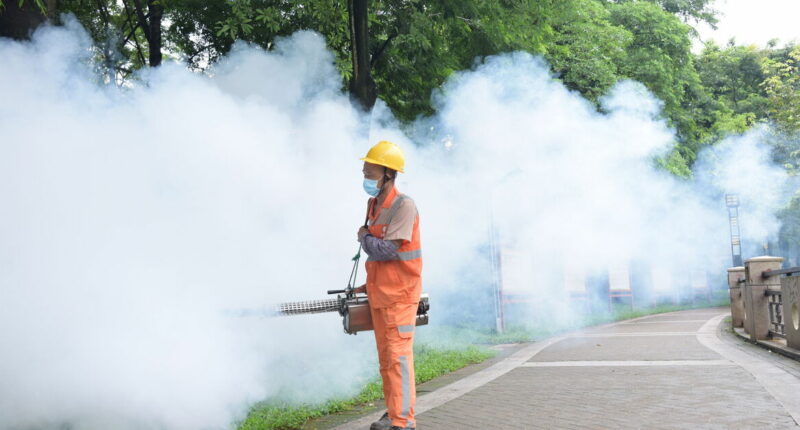Share this @internewscast.com
Travellers heading to southern China have been warned to take urgent precautions including vaccinations amid a severe outbreak of the mosquito-borne chikungunya virus in Guangdong province. According to the US Centers for Disease Control and Prevention (CDC), most of the more than 7,000 cases so far have been reported in the city of Foshan, a major industrial hub near Hong Kong.
The CDC has issued a Level 2 travel health notice, advising people to practise enhanced precautions and, where possible, to get vaccinated before travelling. Two vaccines – a live-attenuated version called IXCHIQ and a newer virus-like particle vaccine known as VIMKUNYA – are approved in the United States, though the former is not recommended for people aged 60 or over due to concerns about rare but serious adverse effects. Pregnant women, particularly those close to their due date, are strongly advised to reconsider travel altogether due to the risk of transmitting the virus to their babies during delivery.
Chikungunya is spread by infected Aedes mosquitoes and causes fever, rash and often debilitating joint pain that can last for weeks or months.
While it is rarely fatal, elderly people, infants, and those with underlying conditions face a higher risk of complications. The outbreak in Guangdong, China’s worst in over a decade, has prompted drastic government intervention.
Officials have launched sweeping anti-mosquito campaigns, including spraying city streets with disinfectant, deploying drones to search for stagnant water on rooftops, and using mosquito-eating fish to control larvae.
Local authorities have warned residents they could face fines of up to 10,000 yuan (£1,100) or even electricity cuts if they fail to clear standing water from their properties.
The scale of the outbreak and the speed of China’s response has drawn comparisons to the country’s heavy-handed approach during the COVID-19 pandemic.
In Foshan, confirmed patients are being forced to stay in hospital for a minimum of one week, even if their symptoms are mild.
Though the virus does not spread from person to person, a short-lived home quarantine was briefly enforced before being dropped. State media has shown workers fogging neighbourhoods, construction sites and even the entrances to office buildings – a visible show of force aimed at controlling both the outbreak and any potential public criticism.
So far, authorities have reported that mosquito density in affected villages has been significantly reduced, thanks to massive clean-up operations. The government has also set up thousands of mosquito-proof isolation beds across hospitals in the province.
Nevertheless, the crisis has raised fresh concerns about how climate change is fuelling the spread of tropical diseases into previously unaffected areas.
Heavy rainfall and extreme summer heat have created ideal breeding conditions for the Aedes mosquitoes, and scientists warn such outbreaks are likely to become more common.
With the US already advising citizens not to travel to Guangdong, and other countries including Bolivia and Brazil also experiencing outbreaks, the chikungunya virus is quickly becoming a serious global concern.
British travellers planning to visit southern China are urged to take the situation seriously: avoid mosquito bites, speak to a doctor about vaccination if eligible, and seek medical attention immediately if symptoms appear during or after their trip.














